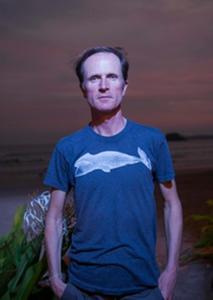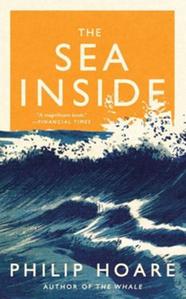 Philip Hoare is the author of seven works of nonfiction, including Oscar Wilde's Last Stand, Spike Island and biographies of Stephen Tennant and Noël Coward. The Whale won the BBC Samuel Johnson Prize for 2009. The Sea Inside (Melville House, April 29, 2014) is a yearlong adventure through the world's oceans. Hoare is associate professor in creative writing at the University of Southampton, England, and curator of the Moby-Dick Big Read--a free online version of Herman Melville's book featuring Tilda Swinton, Stephen Fry, Benedict Cumberbatch, John Waters, Mary Oliver, Tony Kushner, Nathaniel Philbrick, Dennis Minsky, Witi Ihimaera, David Attenborough and many others. He is a regular contributor to the Guardian and swims, every day, in the sea.
Philip Hoare is the author of seven works of nonfiction, including Oscar Wilde's Last Stand, Spike Island and biographies of Stephen Tennant and Noël Coward. The Whale won the BBC Samuel Johnson Prize for 2009. The Sea Inside (Melville House, April 29, 2014) is a yearlong adventure through the world's oceans. Hoare is associate professor in creative writing at the University of Southampton, England, and curator of the Moby-Dick Big Read--a free online version of Herman Melville's book featuring Tilda Swinton, Stephen Fry, Benedict Cumberbatch, John Waters, Mary Oliver, Tony Kushner, Nathaniel Philbrick, Dennis Minsky, Witi Ihimaera, David Attenborough and many others. He is a regular contributor to the Guardian and swims, every day, in the sea.
On your nightstand now:
David Thomson's The People of the Sea: Celtic Tales of the Seal-Folk, Derek Jarman's Modern Nature and James Boyce's Van Diemen's Land. I read at least three books at once. I can barely walk in my bedroom for the towering piles. Haven't people been killed by falling books? What a glorious/ignominious way to go, depending on which book brained you. Now there's an idea for a new category.
Favorite book when you were a child:
Rosemary Sutcliff's The Eagle of the Ninth, because I desperately wanted to be a Roman centurion (I think it was the red skirts that got me); and C.S. Lewis's Narnia stories, because I sought transformation out of my southern English suburb.
Your top five authors:
Emily Brontë, W.G. Sebald, William Shakespeare, Denton Welch, Herman Melville.
Book you've faked reading:
Herman Melville's Moby-Dick. Tried to read it three times. Only when I discovered how wickedly subversive, pornographically funny and deeply demented it is, did I realise it was my book for life. Until then, I just lied about it. The gorgeous Barry Moser-illustrated Arion Press edition swung it for me. I found it in Tim's Bookstore in Provincetown, Mass. The power of reading it in New England and seeing whales in the wild for the first time turned me into a whalehead--or "whale stalker," as John Waters accused me. He also took one look at my whale photos and said, "That's just whale porn."

Herman Melville's Moby-Dick. As above. I virtually hit people over the head with it. Not many people really know it in the U.K. It's not read in school there, for instance, as it is (or used to be) in the U.S. It makes me laugh that the Harry Potter novels get banned for their pagan propaganda when America's greatest novel is full of circle-jerks and men getting married to each other.
Book you've bought for the cover:
Denton Welch's A Voice from a Cloud. I found it in what we English used to call a "jumble sale" when I was a teenager. A powerful perversion for a young boy. Welch's acute, obsessive eye sees the strangest things in the British Home Counties; he is a perfervid figure from the fin de siècle, relocated to suburbia. A great, if minor artist, his drawings decorated his own books.
Book that changed your life:
W.G. Sebald's The Rings of Saturn. I was trying to write my book Spike Island when a director friend, Adam Low, gave me Sebald's book. I suddenly felt liberated. I could write in an entirely different way. One day a postcard arrived saying how much the sender had enjoyed the book. It was signed "Max." It took me awhile to realise who had written it. [Ed. note: Max was Sebald's nickname.]
Favorite line from a book:
It has to be those three short words which are an entire narrative in themselves: "Call me Ishmael." So, is that his name? That uncertainly pervades the rest of the book. You have this suicidal misanthrope who finds himself caught up in the madness of a ship of fools, observing nature in the most metaphysical manner, and who--spoiler alert--survives as an orphan of the sea. (It's amazing how many people think Ahab kills Moby Dick; in fact, the whale wins.) All that sense of prophecy, it seems to me, is caught up that opening line, and the closing one, which might yet be an epitaph for us all: "Now small fowls flew screaming over the yet yawning gulf; a sullen white surf beat against its steep sides; then all collapsed, and the great shroud of the sea rolled on as it rolled five thousand years ago."
Book you most want to read again for the first time:
Emily Brontë's Wuthering Heights. It's a book to curl up on a sofa with, with a mug of tea and at least six ginger biscuits. My father came from Yorkshire, and on holiday visits to relatives we often went to Haworth and the Brontës' vicarage on the moors. Even now it seems to me a deeply haunted place with its soot-blackened buildings and cobbled streets. Emily Brontë's imagination is beyond extreme, as her book is sui generis. It's the English equivalent of Moby-Dick, full of madness and passion. And if the whale was a phallic symbolic to Melville, then to Brontë the moor was a sexual organ. The Australian writer Cassandra Pybus even hypothesises that Heathcliff was a black slave, "rescued" from Liverpool's docks.
Character in literature you'd most like to be:
Cedric in Love in a Cold Climate by Nancy Mitford. I love the scene in which he is attacked by a gruff military-type for buying a copy of Vogue on a railway platform. "It was well worth it though," says Cedric, "lovely Spring modes."

